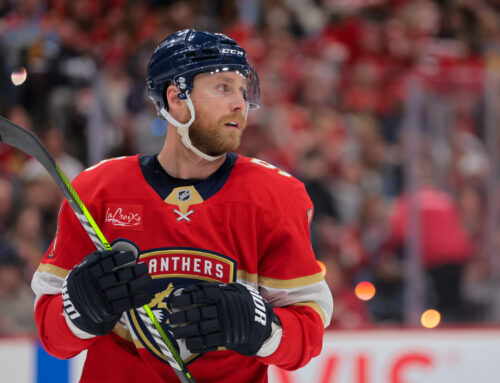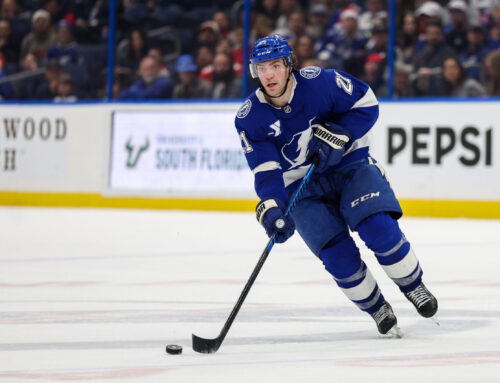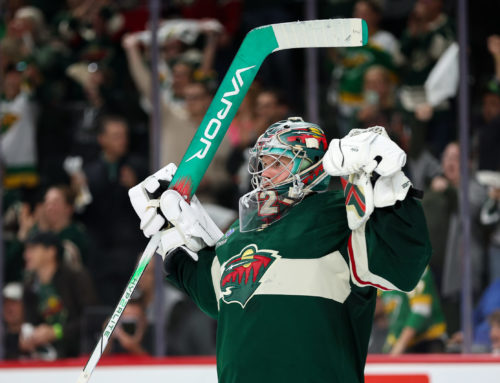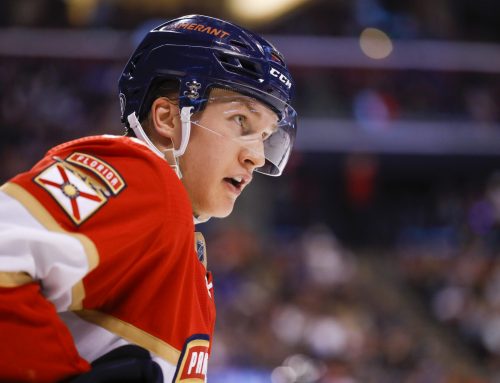Martin St. Louis vs. Jarome Iginla
Rick Roos
2014-09-10

The battle of the veteran fantasy hockey studs – St. Louis vs. Iginla
Continuing my recent pattern, Cage Match again features a battle between players with similar point projections in the DobberHockey 2014 Fantasy Hockey Guide. But the catch remains I won't tell you what those point projections are exactly – for that you'll need to order the Guide, which remains far and away the best fantasy hockey resource you can find.
This week revisits a match from early 2012 (when Steve Laidlaw was penning this column) featuring two aging yet still productive forwards – Jarome Iginla and Martin St. Louis – to see if both are poised to continue drinking from the fountain of youth, and to decide who will produce better in 2014-15, which marks the first full season for each on his new team.
Career Path and Contract Status/Cap Implications
It's not necessary to discuss either player's early and middle career data here. For one, both are household names with well-known stats and accomplishments. But also, for two players their age (Iginla is 37, St. Louis is 39), what happened 5-10+ years ago is less relevant in predicting their near term production than it would be for those in their early 30s or younger.
That having been said, neither player has shown recent signs of slowing down despite their advancing ages (and in the case of St. Louis, graying playoff beard). For Iginla, 2013-14 saw him achieve a 12th straight full season of 30+ goals, while St. Louis led the NHL in scoring in 2012-13, posting a higher point per game average (1.25) than when he won the Art Ross in 2003-04 (1.15).
Iginla just signed a three year UFA deal with Colorado where he'll receive $5.33M per season (AAV and Cap hit), while St. Louis enters 2014-15 on the last season of a four year deal that brings with it a nearly identical $5.625M AAV and Cap hit.
Ice Time
Although Iginla has yet to play for his new team, we've already seen (here and here) that Colorado coach Patrick Roy likes to spread around Ice Time quite evenly. But that's the same philosophy as Iginla's last team – the Boston Bruins, so his 2013-14 Ice Time will be particularly important to scrutinize. With St. Louis, we won't have ideal information, what with him having spent less than a quarter of the 2013-14 regular season with the Rangers.
|
Season |
Total Ice Time per game (rank among team's forwards) |
PP Ice Time per game (rank among team's forwards) |
SH Ice Time per game (rank among team's forwards |
|
2013-14 |
18:12 (J.I.) – 2nd 18:29 (MSL – NYR) – 2nd 21:41 (MSL – TAM) – 1st |
2:30 (J.I.) – 2nd 2:51 (MSL – NYR) – 2nd 3:27 (MSL – TAM) – 3rd |
0:24 (J.I.) – 10th 0:56 (MSL – NYR) – 8th 1:13 (MSL – TAM) – 6th |
|
2012-13 |
19:17 (J.I. – CAL) – 2nd 17:40 (J.I. – PIT) – 4th 21:59 (MSL) – 2nd |
3:11 (J.I. – CAL) – 1st 3:55 (J.I. – PIT) – 4th 3:36 (MSL) – 2nd |
0:16 (J.I. – CAL) – 12th 0:00 (J.I. – PIT) 0:47 (MSL) – 7th (tied) |
|
2011-12 |
20:36 (J.I.) – 1st 22:37 (MSL) – 1st |
3:20 (J.I.) – 1st 3:46 (MSL) – 2nd |
0:01 (J.I.) – 15th (tied) 0:25 (MSL) – 10th (tied) |
|
2010-11 |
20:56 (J.I.) – 1st 20:58 (MSL) – 1st |
4:01 (J.I.) – 1st 4:31 (MSL) – 2nd |
0:05 (J.I.) – 13th 0:27 (MSL) – 7th |
With Iginla, a clear downward trend has emerged in that as his overall Ice Time and PP Ice time have fallen in each of the past three full seasons, so too have his points (from 86 in 2010-11, to 67 in 2011-12, to 61 in 2013-14). But if we look at Ice Time numbers from last season in Colorado and consider Iginla's Cap hit (which will be fourth among Avalanche forwards in 2014-15), it's pretty safe to predict that he won't see less overall or PP Ice Time for the Avs in 2014-15 than he did for the Bs in 2013-14. That, plus the fact that the Avs – also like the Bs – roll out two excellent offensive lines, means that Iginla should see similar minutes with similar quality linemates in 2014-15, which in turn suggests that a return to 60+ points is more likely than not provided that age doesn't catch up to him and he didn't benefit from unsustainable luck last season with the Bs, which we'll examine below.
As for St. Louis, he's gone from a top dog in Tampa (and the entire NHL) to merely one of the top six in New York. And while it's not clear that his 19 game regular season stint with New York was indicative of how things will unfold over a full season in terms of production (his eight points in 19 games translates to a defenseman-like 34 points in a full season, so we'll need to see below if he was unsustainably unlucky), it's clear that as a Ranger he's not going to see the 20:58 to 22:37 of overall Ice Time (which placed him in the top five among forwards for each season) or the 3:27 to 4:31 of PP Ice Time (which placed him in the top 12 among forwards for each season) he received while a member of the Lightning from 2010-2012. And with that it's more likely than not that he won't be able to even approach the well more than a point per game he averaged during those three seasons.
Secondary Categories
|
Season |
PIMs (per game) |
Hits (per game) |
Blocked Shots (per game) |
Shots (per game) |
PP Points (per game) |
|
2013-14 |
0.60 (J.I.) 0.12 (MSL) |
1.82 (J.I.) 0.29 (MSL) |
0.34 (J.I.) 0.47 (MSL) |
2.68 (J.I.) 2.52 (MSL) |
0.18 (J.I.) 0.26 (MSL) |
|
2012-13 |
0.70 (J.I.) 0.09 (MSL) |
1.47 (J.I.) 0.48 (MSL) |
0.29 (J.I.) 0.66 (MSL) |
3.04 (J.I.) 2.33 (MSL)
📢 advertisement:
|
0.27 (J.I.) 0.41 (MSL) |
|
2011-12 |
0.52 (J.I.) 0.29 (MSL) |
1.51 (J.I.) 0.22 (MSL) |
0.52 (J.I.) 0.50 (MSL) |
3.06 (J.I.) 2.40 (MSL) |
0.23 (J.I.) 0.20 (MSL) |
|
2010-11 |
0.48 (J.I.) 0.20 (MSL) |
1.25 (J.I.) 0.45 (MSL) |
0.34 (J.I.) 0.78 (MSL) |
3.52 (J.I.) 3.09 (MSL) |
0.36 (J.I.) 0.50 (MSL) |
Other than in 2011-12 for PP points and Blocked Shots, the same player held an advantage in each category for all four of these seasons. And in many cases the advantage was sizable.
It wasn't surprising to see Iginla crush St. Louis in PIM, although truth be told I would've expected St. Louis to have even worse numbers given that he's a three time Lady Byng winner. Meanwhile, Iginla's edge in Hits is not only enormous, but also valuable given that only two players (Alex Ovechkin and Chris Kunitz) had both more Hits and more goals than Iginla in 2013-14.
And although the gap separating Iginla from under St. Louis in Blocked Shots looks to be shrinking, we need to keep in mind that St. Louis posted 16 blocks in his 19 regular season games with the Rangers, which means the two to one advantage that he had held over Iginla in Blocked Shots in 2012-13 and 2010-11 might be on track to recur (if not increase).
Shots look to be a wash, although it's notable that Iginla's per game average has decreased each of the past three seasons, making it yet another production indicator (in addition – as noted above – to overall Ice Time, PP Ice Time, and points) that's unfortunately been on a steady decline. Meanwhile, the Shots total for St. Louis was actually better last season than his more productive prior two campaigns, reinforcing the idea that his downtick in points could've been due to back luck that might not persist.
And in looking at PP points, I was surprised to see that St. Louis averaged only one per every five games in 2011-12 despite posting 74 points in 77 contests. That means he has been able to produce well even if he's not finding success on the PP. As for Iginla, sure enough this is still another production marker that – you guessed it – has decreased each of the past three full seasons.
Luck-Based Metrics
|
Season |
Personal Shooting Percentage |
PDO (5×5) |
IPP (5×5) |
IPP (5×4) |
|
2013-14 |
14.4% (J.I.) 14.7% (MSL) |
1049 (J.I.) 1026 (MSL) |
61.7% (J.I.) 67.8% (MSL) |
52.0% (J.I.) 82.6% (MSL) |
|
2012-13 |
10.4% (J.I.) 17.4% (MSL) |
980 (J.I.) 1014 (MSL) |
70.4% (J.I.) 83.3% (MSL) |
47.4% (J.I.) 76.5% (MSL) |
|
2011-12 |
9.0% (J.I.) 15.2% (MSL) |
1014 (J.I.) 1017 (MSL) |
76.8% (J.I.) 67.6% (MSL) |
59.3% (J.I.) 42.3% (MSL) |
|
2010-11 |
12.8% (J.I.) 13.5% (MSL) |
1003 (J.I.) 1019 (MSL) |
75.4% (J.I.) 82.8% (MSL) |
75.9% (J.I.) 67.5% (MSL) |
What certainly stands out is Iginla's 1049 PDO at 5×5, which was the third highest among all NHL forwards who played 60+ games. But here's the thing – the Bruins as a whole have high PDOs; and Iginla's personal shooting % for 2013-14 was only slightly above his 13.2% career average. What's more, his IPP at 5×5 during 2013-14 was actually the lowest of these four years, and his 5×4 IPP the second lowest. Therefore, taken as a whole, these numbers don't suggest that Iginla was especially lucky or unlucky in 2013-14.
For St. Louis, it turns out he tallied just one goal on 37 shots during his time with the Rangers, whereas if he'd only matched his lifetime 13.5% rate, that would've meant another four goals, which at least would've made his Ranger totals a bit more respectable. As for his IPP, it was the lowest of all these four seasons at 5×5, but the highest at 5×4. And his PDO has run consistently high. All in all, like Iginla he didn't seem to have been overly lucky or unlucky in 2013-14.
Who Wins?
Picking a winner basically boils down to answering two questions – (1) will Iginla's downward path in productive stats continue, or, due to the likelihood of getting similar minutes with similar linemates on Colorado as he did with Boston last season, will he hold steady at 60-65 points, and (2) can St. Louis recapture some semblance of his Tampa Bay magic despite being poised to receive lower Ice Time and having produced poorly in New York during what, in fairness, was a very brief portion of 2013-14.
In the end, it seems more realistic to envision Iginla's production being able to hold steady (if not slightly improve) than for St. Louis to see a big drop.
With Iginla, not only are things in Colorado likely to be comparable to what they were in Boston, but the fact that the Avs signed him to a three year deal that makes him the fourth highest paid forward on the team strongly suggests that he should be put in a position to post at least similar numbers in 2014-15, and in the process halt his downward trends.
And although St. Louis will be incented to do well because he'll be a UFA in the summer of 2015, the reality is he's two years older than Iginla and much of his recent success had resulted from top ten (if not top five) Ice Time among all NHL forwards, during which he was paired with superstar Steven Stamkos. While it's likely safe to say that St. Louis should improve upon the production he showed in his brief 2013-14 tenure with the Rangers, it's no guarantee that he'll even reach the 60 point mark as part of a more balanced offense that – unlike what he was used to in Tampa – will not flow through his line and his line only.
The wild card is cost vs. value, as St. Louis has always been undervalued and many might see his stats from the Rangers as a sign that the wheels have fallen off for him. Meanwhile, Iginla's 30 goal season with the Bs and his high profile contract signing might prompt some to overvalue him. Thus, although I think when the dust settles Iginla is more likely to outpoint St. Louis than vice versa, their value is close enough that if Iginla's cost is too high it might just justify taking St. Louis over him instead, particularly in points only leagues.
| Rick Nash vs. Marian Gaborik | |||
| Dustin Brown vs. Troy Brouwer | |||
| Matt Read vs. Colin Wilson | |||
| Cam Fowler vs Jack Johnson |





 TOR
TOR S.J
S.J ANA
ANA EDM
EDM CAR
CAR DET
DET CGY
CGY VAN
VAN MIN
MIN NYR
NYR
